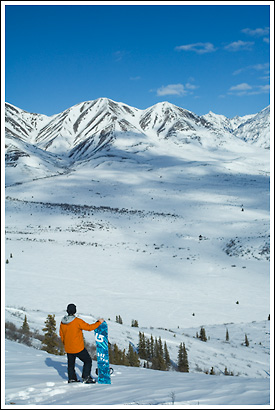
Hey Folks,
Do I look just wicked bad in my orange jacket, or what? You need sartorial advice, you ask me, OK?
Cheers
Carl

Hey Folks,
Do I look just wicked bad in my orange jacket, or what? You need sartorial advice, you ask me, OK?
Cheers
Carl
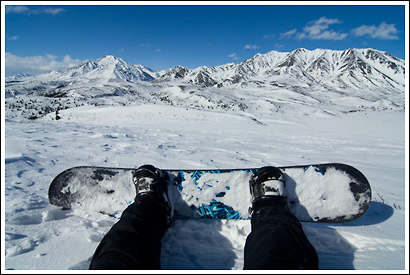
Hey Folks,
Don’t look down. Snowboard champion, Carl Donohue, self-portrait. Or maybe that should be ‘Snow Bored Champion’?
Either way, I set about trying to get some photos of myself riding my snowboard. You can see how steep this run was.
One way to tell how good a snowboarder someone is in photos is how much snow is on their pants .. from this clean pair of Marmot Liquid Steel Gore-Tex XCR pants, you get an impression of someone who doesn’t fall down much.
Well, you might get that impression .. then again, you weren’t out there watching me, were ya? 🙂
Cheers
Carl
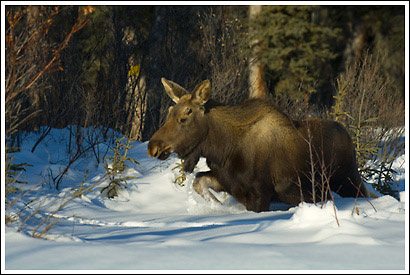
Hey Folks,
Here’s a young bull moose, a yearling, trundling through the snow. Moose have disproportionately longer legs than other members of the deer family, and it really helps them get through deep snow.
This is a helpful advantage as they seek out food in the winter, and also in evading their main predator, the wolf pack.
But the real secret they employ is a kind of double-jointed hip or knee that allows them to lift their legs higher than most ungulates, and high-step their way to safety. When I first saw this fellow, he stepped into a deeper drift that was right up to his belly, yet he managed to clamber his way through, regather, and then set about finding himself some browse for dinner.
The word ‘moose’ comes from a North American Indian Tribe, the Abenaki, and it translates roughly as ‘he trims or cuts off’, a reference to how the Moose browses twigs and bark from trees.
Cheers
Carl
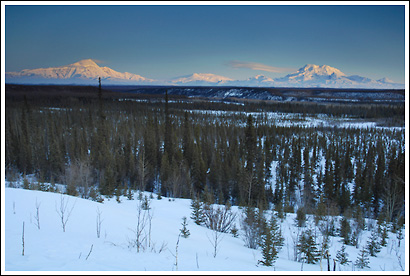
Hey Folks
Here’s what fifty five thousand feet of mountains looks like. From right to left: Mount Drum (12 010′), Mount Wrangell (14 163′), Mount Zanetti (13 009′), and Mount Sanford (16 237′). This photo is from the northern edge of Wrangell-St. Elias National Park, overlooking the Copper River basin. The Wrangell mountains come to life as the sun sinks beneath the horizon. Here’s another photo I took of these mountains a year ago, from much further south and west.
Cheers
Carl
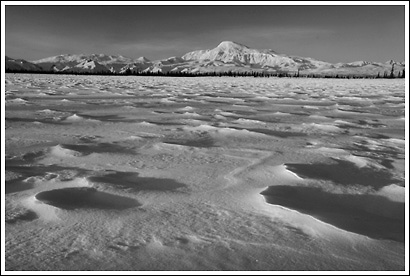
Hey Folks,
This is a photo of Mt Sanford, in winter, taken early one morning. In 2 weeks I had 3 mornings with some alpenglow. The first one I didn’t shoot because it was so socked in with cloud an hour before dawn that I didn’t figure the light was going to happen – and being tired, I slept in. I awoke, looked over, and saw a nice magenta glow on the face of Sanford, but there wasn’t really any kind of way to shoot it from where I was. Such is my life, it seems. I did enjoy a hot coffee and Continue reading
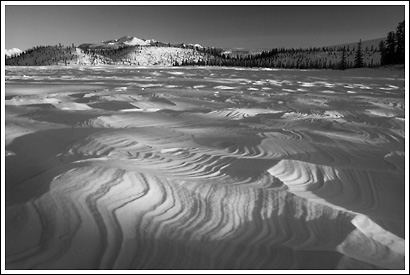
Hey Folks,
I must admit; I really like shooting the patterns the windblown snow makes on the ground in the winter. They can be some pretty cool patterns. This frozen lake, covered in over 3′ of snow (deeper in some places, with drifts) was a nice place to wander around on and look for images.
The setting sun faded slowly across the lake, and I chased it’s light from shore to shore as it slipped into the night. Continue reading
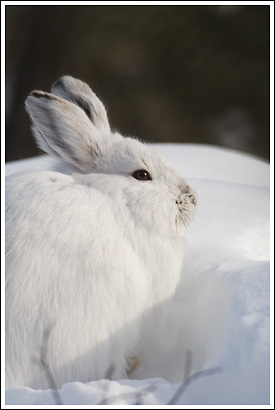
Hey Folks,
Here’s a REAL snowshoe hare photo, taken on my recent sojourn to the northern side of Wrangell-St. Elias National Park. I was very surprised at how little sign of snowshoe hares there was in this area – negligible. Everywhere else, it seems, the woods are crawling with them. This is at, or close to, the peak of the cycle for snowshoe hares; a 10 year population fluctuation that seems to be pretty consistent.
Sometimes the cycle might be 9 years, or 11, but it’s not usually far off. The population rises steadily, then faster, peaks, and falls drastically, almost completely, in a single year. Ecologists aren’t sure as to what causes the drop in numbers, Continue reading
Hey folks,
When I finally figured out about these snowshoes, the next thing I heard about was these ‘snowshoe hairs’. I saw one in the woods, and was able to get a picture: Continue reading
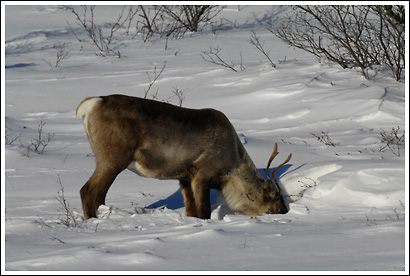
Winter caribou feeding in Wrangell-St. Elias National Park
Hey Folks,
Normally I wouldn’t post a photo of an animal with its head buried under the snow. But, for caribou, this is winter life. Caribou feed on lichens and grasses, and those lie buried, often deep beneath snow’s crust for the long winter months.
Caribou have a few options to eke out their winter, and a heavy snow pack in the winter can be a tough gig for them; finding food is a mission and avoiding predators, namely, the wolf, an equally difficult, if not critical, task. So they’ll typically seek high ground,
Continue reading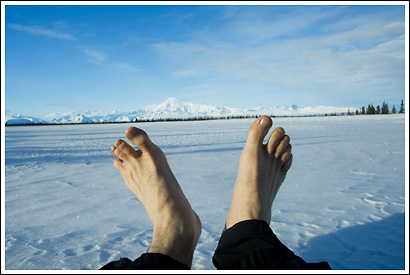
Hey Folks,
Life has a way, all too often, of providing us with little (or large) lessons on what we need to work on. Communication is something that all of us frequently do poorly, and here’s a good example of that, and how it can mess up your day. I’m usually pretty good about seeking advice from those who know better than me (my father will disagree, I’m sure). So when I first came to AK, I asked my good and trusted friend Ron Niebrugge for some advice. Continue reading